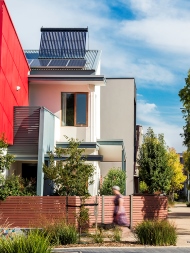13 May 2015
 Empowering industry, government and individuals to reduce carbon emissions is the key goal of a new research node of the Cooperative Research Centre for Low Carbon Living (CRCLCL) to be launched in Adelaide today by University of South Australia Deputy Vice Chancellor Research, Professor Tanya Monro at 3 pm, Lochiel Park, Campbelltown.
Empowering industry, government and individuals to reduce carbon emissions is the key goal of a new research node of the Cooperative Research Centre for Low Carbon Living (CRCLCL) to be launched in Adelaide today by University of South Australia Deputy Vice Chancellor Research, Professor Tanya Monro at 3 pm, Lochiel Park, Campbelltown.
With more than a $1.1million joint investment from UniSA and the CRCLCL, the node will be the State’s premier research hub for multidisciplinary research and innovation into the technologies, urban design, construction and building renovation, consumer choice and energy systems integration that underpin a reduction in carbon emissions.
The investment will fund up to five higher degree research positions.
Prof Monro says the new research node will provide fantastic opportunities to expand postgraduate research into what are industries of the future.
“To limit the impact of climate change, it is not enough to develop new technologies in isolation,” Prof Monro says.
“We also need to empower communities to adopt low-carbon housing solutions via advances in energy and planning policy. By bringing together emerging technologies such as sustainable building materials with policy frameworks that reduce barriers to renewable energy, this CRC promises to make a deep impact and bring the concept of sustainability to low-cost housing.
“The research within this new node will be inspired by the challenges faced by this industry sector.
“We welcome the CRC for Low Carbon Living’s investment in this research node and its support for new higher degree students. The investment in the node at UniSA highlights the calibre of our research into environmentally sustainable construction and development and we hope to attract students who are passionate to make a difference. It’s a wonderful opportunity for us to provide world-class research training in an area that will clearly stimulate new industries and jobs into the future.”
Director of UniSA’s Barbara Hardy Research Institute and Professor of sustainable energy engineering, Wasim Saman says the node in SA is especially significant because it capitalises on the great amount of work being done locally to address the challenges of human’s contribution to climate change.
“Locally the issue of climate change mitigation is very much on the agenda with the State Government outlining a clear direction for change and innovation,” Prof Saman says.
“The research we do in here, focussing UniSA’s expertise on real world technical and planning challenges, will have wide scale application for the nation, particularly in support of sustainable new urban developments and regeneration projects.
“At a time of escalating energy costs, the Node of Excellence in research will pay particular attention to low income housing and deep renovations to reduce utility costs.”
CRCLCL Chief Executive Officer, Prof Deo Prasad says the Node of Excellence will draw on and expand the research program of the Adelaide Living Laboratory (ALL). Already supported by the CRCLCL the ALL developments at Lochiel Park, Tonsley and Bowden are modelling the transition to low carbon impact urban environments.
“In Australia the carbon embodied in building materials combined with the operation of those buildings is responsible for about 40 per cent of national emissions,” Prof Prasad says.
“The research we are engaged in will not only contribute to stemming the progression of climate change, it also has significant immediate economic benefits. As an example, if SA alone made the transition to a net zero energy construction standard, it would reap an economic benefit of almost $1.3 billion.”
Media contacts:
UniSA Michèle Nardelli office: +61 8 8302 0966 mobile: 0418 823 673 email: michele.nardelli@unisa.edu.au
CRCLCL Sharon Kelly mobile: +61 414 780 077 email: s.kelly@lowcarbonlivingcrc.com.au



